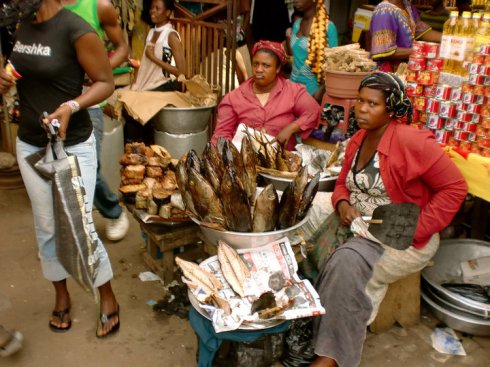These are two excerpts from the journal I kept in Ghana..
– May 2006
“O Broonie!” This is what the kids in the street shout at me. It means ‘hey whitey’, but I’m told this is a term of endearment, not an insult as I first thought. It’s my first day in Accra and all my senses are being assaulted. Nyami, my eternally-grinning tour guide, decides it’s a good day to show me the city – despite the torrential downpour. The streets have been turned into rivers of mud and I’m trying in vain to avoid it. My flip-flops flick mud up the backs of my legs with every step and I have to stop at each corner to wipe it off. I give up on this futile exercise soon afterwards and instead tell myself that being caked in mud from the knee down is a good look.
Nyami takes me into Makola Market – the biggest and busiest in the country. It’s hot and the humidity is at about 95%. Its a bit like walking into the bathroom after someone has just taken a long, hot shower. He tells me they sell everything here from bread, to underwear, to umbrellas, to chickens. He doesn’t tell me they also sell pigs trotters, cows feet, giant snails and buckets of angry crabs. I stop to watch a young girl hack open a cows hoof with a machete; I’m grateful – when the bits of sinew and fat fly onto my legs – that they are still covered in mud. Nyami senses the experience is a bit much for this ‘whitey’ and very graciously takes me to a friends house to wash my legs and feet. I am beginning to realise that I have become squeamish living in London. Not that London is a particularly sanitary place, but this is my first taste of real ‘Africa’. Growing up in suburban Cape Town does not prepare you for this either.
I am yet to have my first supper in Ghana and suddenly have a vision of going home to my lovely Ghanaian host family to find the dinner table laden with boiled pigs trotters and snails the size of my fist. I imagine them sitting around the table with expectant faces and me being forced to eat the mutant molluscs. I doubt I would handle this situation very well. I am relieved when I get home and discover that spaghetti bolognese is on the menu. Its only the next morning I find out that it was made from goats mince.
———————————————————————————————————————-
– June 2006
It’s the day after Ghana beat the USA in the Football World Cup. Making it through to the 2nd round of the tournament is a first for these debutantes. I’m in Kumasi, the capital of the Ashanti region, and Ghana’s victory last night prompted a spontaneous street party throughout the city. I came here with a group of fellow volunteers and we spent the night drinking Star beer, jumping up and down, and hugging everyone we passed.
It was a very happy night, but now its the morning after and I have a severe hangover. This is not helped by the sweltering heat and the humidity which is at its usual level of 97% – not ideal conditions for nursing a hangover. We have to go back to Accra today which, unfortunately for us, means a trek to the other side of Kumasi where the bus terminal is located. After crawling out of our ‘5 star hostel’, we navigate our way through the remnants of last nights celebration to the central market where we hope to find something resembling breakfast. This is Ghana however, and breakfast here rarely comes in the form of a fresh croissant and a cappuccino. Perhaps a stale bread roll and some jam if we’re lucky.
We arrive at the market and march straight into the heaving mass of people ahead. As soon as we’re inside I can smell that this is a bad idea. I can see a woman behind a small table – she appears to be selling a pile of honeycomb. Or perhaps its coral. Why would she be selling coral I wonder – we’re nowhere near the sea… As we get closer the stench confirms what she is selling. Tripe. Great steaming heaps of it. It doesn’t take long until we notice that there is a woman selling tripe at roughly five meter intervals in this market. And if its not a pile of tripe laid out neatly on the table, its a large enamel basin full of slightly rotting fish. The smell is incredible. I can hardly breath and am certain I will either faint or throw up in the next two minutes. Its midday, the sun is fierce, the market is busy and noisy and I feel completely disorientated. I keep bumping into people in my state of semi-consciousness and nearly walk straight into a table full of tripe. The rest of the group are in a similar position and we must look like a bunch of recovering heroin addicts. At this point the thought of eating anything here makes me retch and the relief is tangible when we finally make it out the other side. I can see the bus terminal and now have a three hours of motion sickness to look forward to in a dilapidated mini-bus along the most pot-holed road in Ghana.

